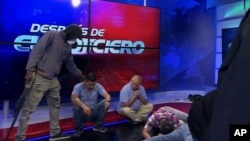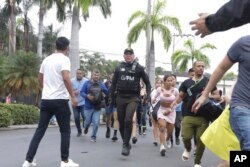Officials in Ecuador say men with face coverings broke into the set of a public television channel in Ecuador waving guns and explosives during a live broadcast on Tuesday.
That led the president to declare that the country had entered an “internal armed conflict.”
The men were armed with guns and what looked like sticks of dynamite. They entered the set of the TC Television network in Guayaquil during a nationwide news program. The men shouted that they had bombs. Noises similar to gunshots could be heard.
No one died in the attack. Officials later said all the 13 intruders had been arrested and would face terrorism charges.
Officials have not said who was behind the television station attack. They also have not said who was behind a series of other recent attacks.
But the violent incidents follow the escapes from prison of two leaders of Ecuador’s most powerful drug gangs.
President Daniel Noboa on Monday declared a national state of emergency. The measure lets officials suspend people’s rights and use the military in places like prisons.
The government has not said how many attacks have taken place since Los Choneros gang leader Adolfo Macías was found missing from his low-security prison cell Sunday. He was supposed to be moved to a high-security facility that day.
On Tuesday, Ecuadorean officials announced that another gang leader, Fabricio Colón Pico of the Los Lobos group, had escaped from prison. Colón Pico was captured on Friday as part of a kidnapping investigation. He has also been accused of trying to murder one of the nation’s lead prosecutors.
Other attacks have included an explosion near the house of the president of the National Justice Court. On Monday night, four police officers were kidnapped.
Will Freeman is a political expert at the Council on Foreign Relations. He said gangs in Ecuador have assassinated a presidential candidate and set off car bombs in front of government buildings in the past. But he said Tuesday's events marked a new peak in violence in the country.
Ecuador sits between Peru and Colombia, the world's largest cocaine producers. In recent years, Ecuador has become a key passage point for cocaine. Much of the violence in the country comes as drug gangs fight each other and the government for control of ports and smuggling points.
Freeman said that Ecuador's government will have to find ways to control prisons, where gang leaders continue to lead their operations. It might have to consider extraditing some of the top criminal leaders to the United States.
Ecuador, a nation of 20 million people, might also have to make judicial changes to give judges greater safety.
“If these guys can storm a TV station or kill a presidential candidate you as a judge will not go up against them,” without promises of safety, Freeman said.
Los Choneros is one of the gangs that officials consider responsible for the increase in violence. It reached a new level of violence last year with the assassination of presidential candidate Fernando Villavicencio. Officials say the gang has links with Mexico’s Sinaloa cartel.
The whereabouts of Macías are unknown. Prosecutors opened an investigation and charged two guards in connection with his apparent escape. But neither the police, the prison system, nor the federal government confirmed whether the prisoner fled the facility or might be hiding in it.
In February of 2013, he escaped from a high-security facility but was recaptured weeks later.
I’m Caty Weaver.
Dan Novak adapted this story for VOA Learning English based on reporting by The Associated Press.
_______________________________________________
Words in This Story
dynamite — n. a powerful explosive that is often used in the form of a stick
intruder — n. a person who is not welcome or wanted in a place
prosecutor — n. a lawyer who represents the side in a court case that accuses a person of a crime and who tries to prove that the person is guilty
smuggle — v. to move from one country into another illegally and secretly
extradite — v. to send to another state or country for trial










Forum